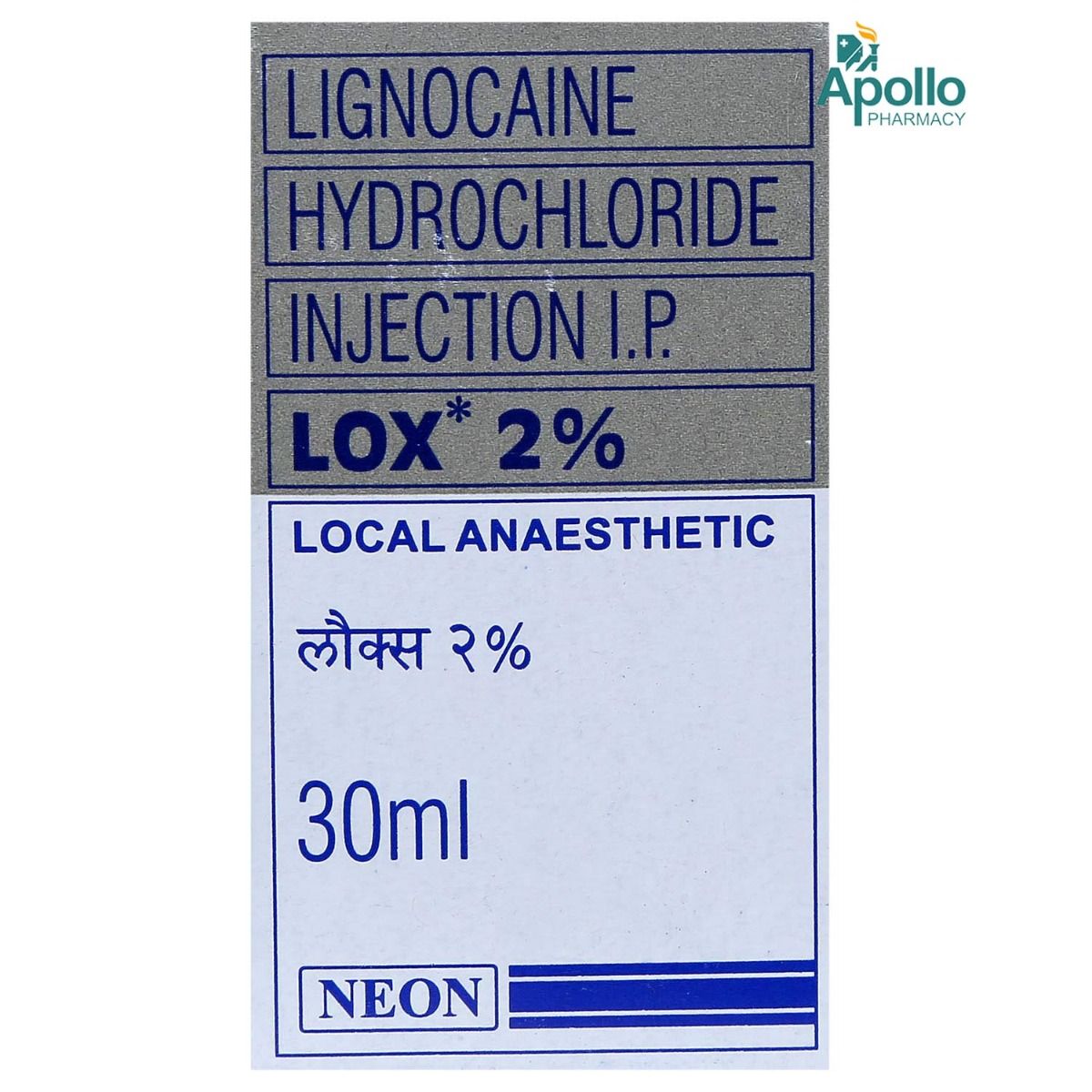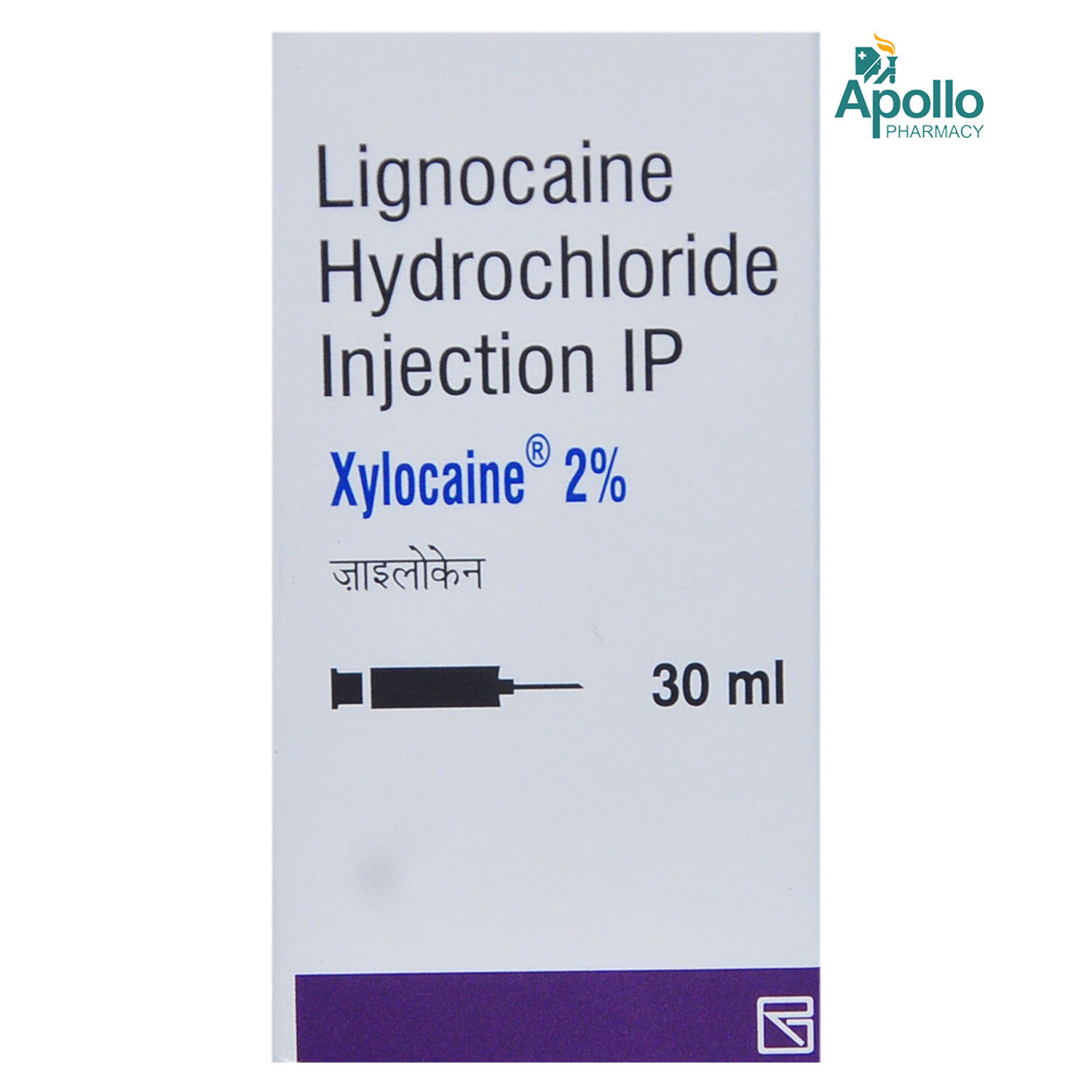Lidocaine Hydrochloride
About Lidocaine Hydrochloride
Lidocaine Hydrochloride is indicated for the production of regional or local anaesthesia. Additionally, it is also used in the management of ventricular arrhythmias (abnormal heartbeat) associated with acute myocardial infarction, or cardiac surgery.
Lidocaine Hydrochloride contains ‘Lidocaine hydrochloride’ that blocks the influx (entry) of sodium ions into the membrane that surrounds the nerves, thereby preventing initiation and conduction of impulses and hence providing an anaesthetic effect. It blocks cardiac sodium channels, thereby treats arrhythmia.
Lidocaine Hydrochloride will be administered by a healthcare professional; do not self-administer. In some cases, you may experience certain common side-effects such as dizziness, high/low blood pressure, nausea, vomiting, and paresthesia (burning or prickling sensation). You are advised to talk to your doctor if you experience these side effects persistently.
Do not take Lidocaine Hydrochloride if you are allergic to any of its components. Consult your doctor if you are pregnant, planning for pregnancy, or breastfeeding. Avoid driving or operating machinery as Lidocaine Hydrochloride may cause dizziness, drowsiness, and loss of sensation. Keep your doctor informed about your health condition and medications to rule out any interactions/side effects.
Uses of Lidocaine Hydrochloride
Medicinal Benefits
Lidocaine Hydrochloride is used for the production of regional or local anaesthesia. It blocks the influx (entry) of sodium ions into the membrane that surrounds the nerves, thereby preventing initiation and conduction of impulses and hence providing an anaesthetic effect. Also, it is indicated in the management of ventricular arrhythmias (abnormal heartbeat) associated with acute myocardial infarction, or cardiac surgery. It blocks cardiac sodium channels, thereby treats arrhythmia.
Directions for Use
Storage
Side Effects of Lidocaine Hydrochloride
- Nausea
- Vomiting
- High/low blood pressure
- Dizziness
- Paresthesia (burning or prickling sensation)
Drug Warnings
Do not take Lidocaine Hydrochloride if you are allergic to any of its contents. Inform your doctor if you have hypovolemia (low blood volume), blood clotting problems, bleeding problems, slow heart rate, myasthenia gravis (muscle problems), epilepsy, heart, kidney or liver problems. Consult your doctor if you are pregnant or breastfeeding. Avoid driving or operating machinery as Lidocaine Hydrochloride may cause dizziness, drowsiness and loss of sensation. Keep your doctor informed about your health condition and medications to rule out any interactions/side effects.
Drug Interactions
Drug-Drug Interactions: Inform your doctor if you are taking other anaesthetics, antiarrhythmics, anti-viral agents, sedatives, beta-blockers (metoprolol, propranolol), calcium channel blockers (amiodarone), vasoconstrictors (epinephrine, norepinephrine), antacid (cimetidine), anti-convulsants (phenobarbital, phenytoin, carbamazepine, primidone), antibiotic (erythromycin), anti-psychotics (fluvoxamine).
Drug-Food Interactions: No interactions found/established.
Drug-Disease Interactions: Inform your doctor if you have hypovolemia (low blood volume), blood clotting problems, bleeding problems, slow heart rate, myasthenia gravis (muscle problems), epilepsy, heart, kidney or liver problems.
Drug-Drug Interactions Checker List:
Safety Advice

Alcohol
cautionIt is not known if alcohol affects Lidocaine Hydrochloride. Please consult your doctor if you have any concerns regarding this.

Pregnancy
cautionPlease consult your doctor if you are pregnant or planning for pregnancy. Your doctor will prescribe only if the benefits outweigh the risks.

Breast Feeding
cautionPlease consult your doctor if you are breastfeeding. Your doctor will decide if Lidocaine Hydrochloride can be taken by breastfeeding mothers or not.

Driving
cautionAvoid driving or operating machinery as Lidocaine Hydrochloride may cause dizziness, drowsiness and loss of sensation.

Liver
cautionLidocaine Hydrochloride should be used with caution in patients with liver impairment/liver disease. Please consult your doctor if you have any concerns regarding this.

Kidney
cautionLidocaine Hydrochloride should be used with caution in patients with kidney impairment/kidney disease. Please consult your doctor if you have any concerns regarding this.

Children
cautionPlease consult your doctor if you have any concerns regarding the usage of Lidocaine Hydrochloride in children.
Habit Forming
Diet & Lifestyle Advise
- Include a diet rich in whole grains, lean proteins, vegetables, and fruits.
- Avoid smoking and alcohol consumption.
- Maintain a healthy weight with a proper diet and safe exercises.
- Manage stress with meditation and yoga.
Patients Concern
Disease/Condition Glossary
Local anaesthesia: It causes numbing/loss of sensation to a specific area of the body. It is used to treat pain, or to prevent pain during surgery or medical procedure.
Ventricular arrhythmia: Ventricular arrhythmia is a condition in which abnormal heartbeats originate in the ventricles (lower chambers of the heart). This limits/prevents the heart’s ability to pump blood throughout the body. Symptoms include palpitations (a feeling as if the heart is pounding), chest pain, fainting, sweating, shortness of breath, and light-headedness.
FAQs
Lidocaine Hydrochloride is indicated for the production of regional or local anaesthesia. Additionally, it is also used in the management of ventricular arrhythmias (abnormal heartbeat) associated with acute myocardial infarction, or cardiac surgery.
Lidocaine Hydrochloride blocks the influx (entry) of sodium ions into the membrane that surrounds the nerves, thereby preventing initiation and conduction of impulses and hence providing an anaesthetic effect. Lidocaine Hydrochloride blocks cardiac sodium channels, thereby treats arrhythmia.
Lidocaine Hydrochloride may cause hypotension (low blood pressure) or hypertension (high blood pressure). Therefore, regular monitoring of blood pressure whilst on treatment with Lidocaine Hydrochloride is advised.
Nausea and vomiting might be a side effect of Lidocaine Hydrochloride. It is not necessary for everyone taking Lidocaine Hydrochloride to experience this side effect. However, if the condition persists or worsens, please consult a doctor.
Lidocaine Hydrochloride might increase creatinine phosphokinase levels. Therefore, if you are undergoing any tests, inform the person doing the tests that you have taken Lidocaine Hydrochloride.









